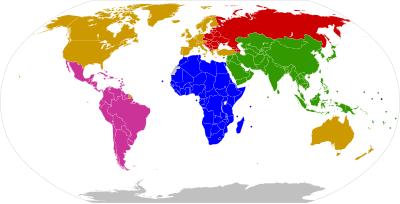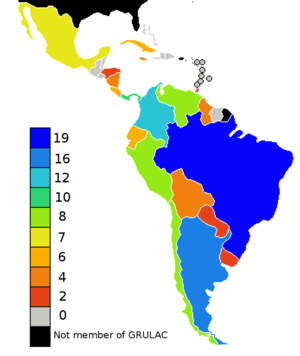사용자:배우는사람/문서:United Nations Regional Groups
원본 및 작업 문서
편집- United Nations Regional Groups • e • h》의 • e • h》
사용자:배우는사람/문서:United Nations Regional Groups/영문판
생성: 2010년 9월 29일 (수) 현재 [[:en:United Nations Regional Groups]]의 최신판인 21:56, 20 August 2010 · id=380036205 판을 복사
United Nations Regional Groups편집
The United Nations is unofficially divided into five geopolitical regional groupings. What began as an informal means of sharing the distribution of posts for General Assembly committees has taken on a much more expansive role. Depending on the UN context, regional groups control elections to UN-related positions, dividing up the pie on the basis of geographic representation, as well as coordinate substantive policy, and form common fronts for negotiations and voting.  African Group Asian Group Eastern European Group Latin American and Caribbean Group Western European and Others Group Non-UN state or territory The five groups are:
Three states—the United States, Israel, and Kiribati—are not included in the above numbers (see below). Members of each group편집African Group편집 Algeria, Angola, Benin, Botswana, Burkina Faso, Burundi, Cameroon, Cape Verde, Central African Republic, Chad, Comoros, Republic of the Congo, Côte d'Ivoire, Democratic Republic of the Congo, Djibouti, Egypt, Equatorial Guinea, Eritrea, Ethiopia, Gabon, The Gambia, Ghana, Guinea, Guinea-Bissau, Kenya, Lesotho, Liberia, Libya, Madagascar, Malawi, Mali, Mauritania, Mauritius, Morocco, Mozambique, Namibia, Niger, Nigeria, Rwanda, São Tomé and Príncipe, Senegal, Seychelles, Sierra Leone, Somalia, South Africa, Sudan, Swaziland, Togo, Tunisia, Uganda, Tanzania, Zambia, Zimbabwe.[1] Asian Group편집Afghanistan, Bahrain, Bangladesh, Bhutan, Brunei Darussalam, Cambodia, China, Cyprus, Democratic People's Republic of Korea, Fiji, India, Indonesia, Iran, Iraq, Japan, Jordan, Kazakhstan, Kuwait, Kyrgyzstan, Laos, Lebanon, Malaysia, Maldives, Marshall Islands, Federated States of Micronesia, Mongolia, Myanmar, Nauru, Nepal, Oman, Pakistan, Palestine,[2] Palau, Papua New Guinea, Philippines, Qatar, South Korea, Samoa, Saudi Arabia, Singapore, Solomon Islands, Sri Lanka, Syria, Tajikistan, Thailand, Timor-Leste, Tonga, Turkmenistan, Tuvalu, United Arab Emirates, Uzbekistan, Vanuatu, Vietnam, Yemen.[1] Eastern European Group편집Albania, Armenia, Azerbaijan, Belarus, Bosnia and Herzegovina, Bulgaria, Croatia, Czech Republic, Estonia, Georgia, Hungary, Latvia, Lithuania, Macedonia, Montenegro, Moldova, Poland, Romania, Russia, Serbia, Slovakia, Slovenia, Ukraine.[1] Latin American and Caribbean States (GRULAC)편집 Antigua and Barbuda, Argentina, Bahamas, Barbados, Belize, Bolivia, Brazil, Chile, Colombia, Costa Rica, Cuba, Dominica, Dominican Republic, Ecuador, El Salvador, Grenada, Guatemala, Guyana, Haiti, Honduras, Jamaica, Mexico, Nicaragua, Panama, Paraguay, Peru, Saint Kitts and Nevis, Saint Lucia, Saint Vincent and the Grenadines, Suriname, Trinidad and Tobago, Uruguay, Venezuela.[1] Western European and Others Group (WEOG)편집Andorra, Australia, Austria, Belgium, Canada, Denmark, Finland, France, Germany, Greece, Iceland, Ireland, Israel (New York activities only), Italy, Liechtenstein, Luxembourg, Malta, Monaco, the Netherlands, New Zealand, Norway, Portugal, San Marino, Spain, Sweden, Switzerland, Turkey, United Kingdom.[1] Special cases편집United States편집The United States is not a member of any regional group, but attends meetings of the Western European and Others Group as an observer and is considered to be a member of that group for electoral purposes.[1] Israel편집Israel is a member of WEOG but with limited competencies only. In 2000, Israel, though naturally a part of the Asian Group in geographical terms but with membership withheld due to the large majority of Muslim countries in the Asian block who refuse to allow Israel's acceptance, was admitted on temporary basis (subject to renewal) to WEOG's New York activities, thereby enabling it to be a candidate for election to various UN bodies.[3] In 2004, Israel obtained a permanent renewal to its membership to the WEOG for New York activities.[4] On June 14, 2005, Dan Gillerman was elected to the position of Vice-President of the 60th UN General Assembly. The last Israeli to hold this position was UN envoy Abba Eban in 1952. Israel's candidacy was put forward by WEOG. In this position, Gillerman played a central role during the initial negotiation stages of the 2006 Israel-Lebanon conflict. Kiribati편집As of May 2006, Kiribati (geographically in Asia) is not a member of any regional group.[1] Despite its membership in the United Nations, Kiribati has never delegated a permanent representative to the UN. Turkey편집Turkey participates fully in both the Asian and WEOG groups, but for electoral purposes is considered a member of WEOG only.[1] Proposed new groupings편집Pacific편집In 2000, the government of Nauru—at present, a member of the Asian group—called for a new regional group titled Oceania. Aside from Nauru, this proposed bloc may also include Australia and New Zealand (both in WEOG), Japan, South Korea, the ASEAN countries, and the rest of Oceania.[5] Criticisms편집
A criticism of the regional grouping system is the pressure brought to bear on members to vote consistent with the majority of their regional group. For countries which may have political differences, this can weaken their negotiating positions on a number of issues and an inability to be elected to key leadership positions in the UN. References편집
See also편집
Western European and Others Group편집
 The Western European and Others Group (WEOG) is one of several unofficial Regional Groups in the United Nations that act as voting blocs and negotiation forums. Regional voting blocs were formed in 1961 to encourage voting to various UN bodies from regional groups. Almost all members are in Western Europe, but WEOG is unusual in that geography is not the sole defining factor; Europe is divided to it and the Eastern European Group, and the WEOG also contains Canada, Australia, and New Zealand, which are culturally and politically descendant from Western European states but are located far away from them. The group also contains two affiliated members, Israel and the United States, which work with the group on some issues and act as observers to most of their meetings. There are 29 member states as of 2005. WEOG Member States편집Western Europe편집
Others편집Partial membership편집
The UN's regional grouping system is subject to periodic review. Suggestions to re-arrange the group편집In 2000, Israel, though naturally a part of the Asian Group in geographical terms but with membership blocked by Arab countries, was admitted on a temporary basis (subject to renewal) to WEOG's New York activities, thereby enabling it to be a candidate for election to various UN bodies.[1] In 2004, Israel obtained a permanent renewal to its membership to the WEOG for New York activities. Without a regional membership, Israel had been unable to be elected to various UN activities and bodies and was therefore voiceless.[2] On June 14, 2005, Dan Gillerman was elected to the position of Vice-President of the 60th UN General Assembly. The last Israeli to hold this position was UN envoy Abba Eban in 1952. Israel's candidacy was put forward by the United Nations Western Europe and Others Group (WEOG). In this position, Gillerman played a central role during the initial negotiation stages of the 2006 Israel-Lebanon conflict. In 2000, the nine-month anniversary of Nauru's UN membership in the Asian Group prompted a call by that country for a new Oceania regional grouping including Australia and New Zealand within the United Nations regional voting system.[3] References편집
Eastern European Group편집 The Eastern European Group (also Countries with Economies in Transition, CEIT) is one of the five unofficial Regional Groups in the United Nations that act as voting blocs and negotiation forums. Regional voting blocs were formed in 1961 to encourage voting to various UN bodies from regional groups. The group consists of countries in Eastern Europe and the Caucasus, which form the area of the former Eastern Bloc. The group currently has 23 members and has one seat in the United Nations Security Council (UNSC), currently held by Bosnia and Herzegovina.
History편집Prior to the creation of the Regional Groups in 1966, the UNSC had an Eastern European and Asian Seat, that was taken between 1946 and 1966 by countries from Eastern Europe (including Greece and Turkey, members of the modern Western European and Others Group (WEOG)) and Asia (members of the modern Asian Group). The Eastern European Group exists since 1966. It has changed significantly due to the dissolution of some of its members. These dissolutions are those of the Soviet Union (1991), Yugoslavia (1991-2006), and Czechoslovakia (1993). Also, through the reunification of Germany, the Eastern European Group lost East Germany as its member. All the countries created in Europe stayed in the bloc, and the post-Soviet states geographically in Asia joined the Asian Group.
Members편집
Historical members편집
Timeline of membership편집As the Eastern European Group changed significantly over time, the number of its members had also changed.
Notes편집 |